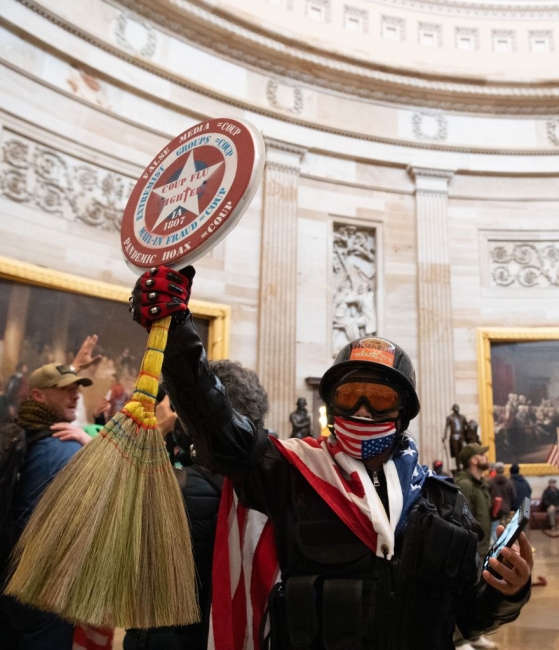You have /5 articles left.
Sign up for a free account or log in.

Participant in Capitol Hill riot on Jan. 6.
Saul Loeb/AFP/Getty Images
A few hours after the horrifying attack by Trump supporters on the U.S. Capitol, I received a text from a friend noting, with distress, the picture of Republican senator Josh Hawley pumping his fist in support of the mob just a few hours before the attacks. “But Hawley went to Stanford,” they wrote. “He was a history major! Shouldn’t he know better than to encourage this?”
That is a common sentiment. Since the attack, many of my fellow progressives, especially those who, like me, are educators, have sought to reaffirm the importance of learning based on a very straightforward conviction: a better-educated populace produces a better society. “The embrace of reason and the advancement of knowledge, key elements of our mission as a research university, are central to ensuring that an educated populace can employ critical thinking skills to participate in and strengthen our republic,” the chancellor of my employer, the University of Massachusetts, wrote on Jan. 7 in a characteristic articulation of this sentiment. In a similar vein, Dennis C. Jacobs and Patrick Hornbeck argued in Inside Higher Ed that “if higher education is to live up to our mission, our very reason for being, we have to ask what we did -- and what we failed to do -- that helped make possible the tragic events of Jan. 6.”
This line of thinking is not new; in fact, a version of “better education can produce better citizens” has pervaded philosophical thought since its origins. Socrates was made to drink poison for preaching what he deemed better education to Athenian youth; Christian theologians like St. Augustine and Martin Luther articulated their own versions of it in emphasizing that reading Scripture was the route to spiritual transformation. And a similar sentiment motivates the publicly engaged educators who, in the aftermath of modern day tragedies, use social media to create “syllabi,” such as #CharlottesvilleSyllabus, a collection of readings intended to help educate the public about white supremacy, which activists compiled in the wake of the 2017 attack on the Virginia city. If only people read more and knew more, or read the “correct” things, or so this sentiment wants us to believe, they might “know better” than to engage in unacceptable behavior.
But this line of thinking has two categorical errors. For starters, it overlooks the fact that encountering a given text, event or idea doesn’t necessarily result in a specific behavioral outcome. A student who reads Plato’s Republic may well conclude that Thrasymachus, Socrates’s interlocutor who argues that “justice” means simply the advantage of the stronger is right, and then concur with President Trump’s entreaty to his supporters on Wednesday that “you’ll never take back our country with weakness, you have to show strength.” The same may be true for someone who reads the work of progressive thinkers and writers who have argued for defunding or reforming the police: it’s entirely possible for them to conclude that such thinkers are wrong and that a more militarized law enforcement is necessary.
Reading, listening and thinking produces unpredictable results -- no educational program, including one oriented toward social justice, has any necessary, inherent outcomes built into it. Critical thinking skills can as easily lead people to justify or excuse inequality or violence as it can lead them to oppose such things.
Further, the belief that a better-educated populace will in itself strengthen democracy overlooks the fact that education is but one of the many social, political and economic influences on a person’s worldviews. People don’t stop learning or thinking after they graduate from college or even after they read a “syllabus” intended to render them more woke. Rather, they continue to encounter experiences that may well lead them to reject the ideas they previously encountered.
This does not mean that what goes on in the classroom is irrelevant or unnecessary. Instead, it should prompt us to recognize that education is but one factor in a broader matrix of social relations that have to be fixed in total, not in a piecemeal fashion. Absent jobs, housing, food and access to affordable health care, better education will not in itself fix what is broken in American society.
This moment calls for bold, transformational thinking and action to build a more peaceful and just political culture. Educators, especially those working in colleges and universities, have vital roles to play -- but that role extends far beyond campus. Indeed, it requires our active involvement in our communities. A greater emphasis on our own political engagement -- as organizers and candidates for public office -- is vital if we are to push for a better society. Just as we teach critical and humane engagement with texts and ideas for our students in class, we also should model activist scholarship that embraces both knowledge production and political change. In turn, we need our institutions and professional communities to incentivize and reward publicly engaged scholarship that treats the classroom as only one area of social transformation, and constantly pushes us to reach beyond it.







